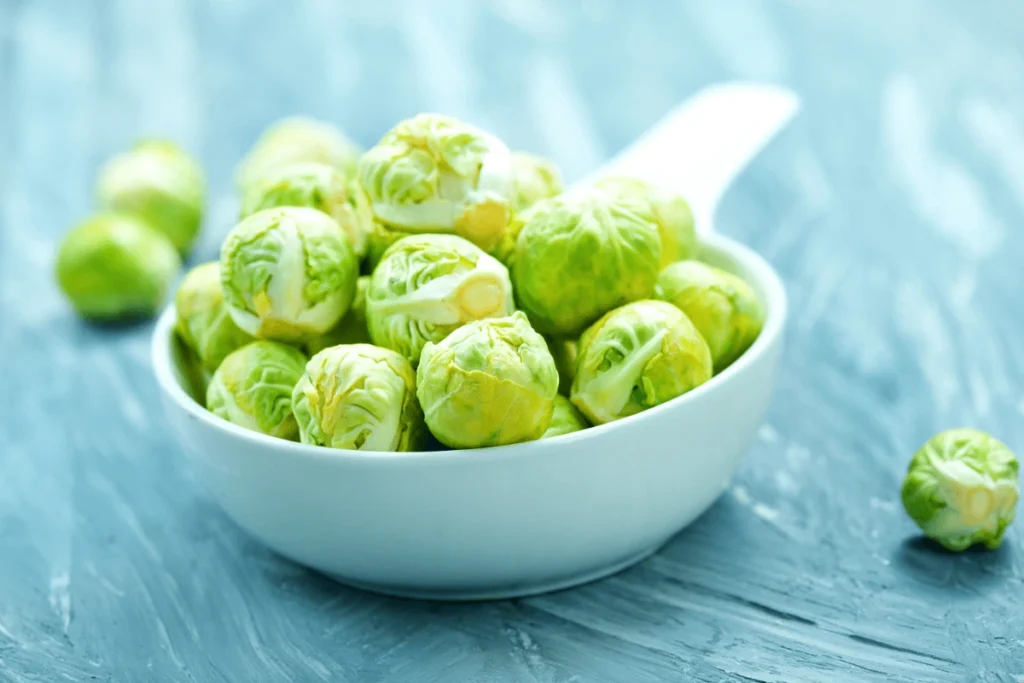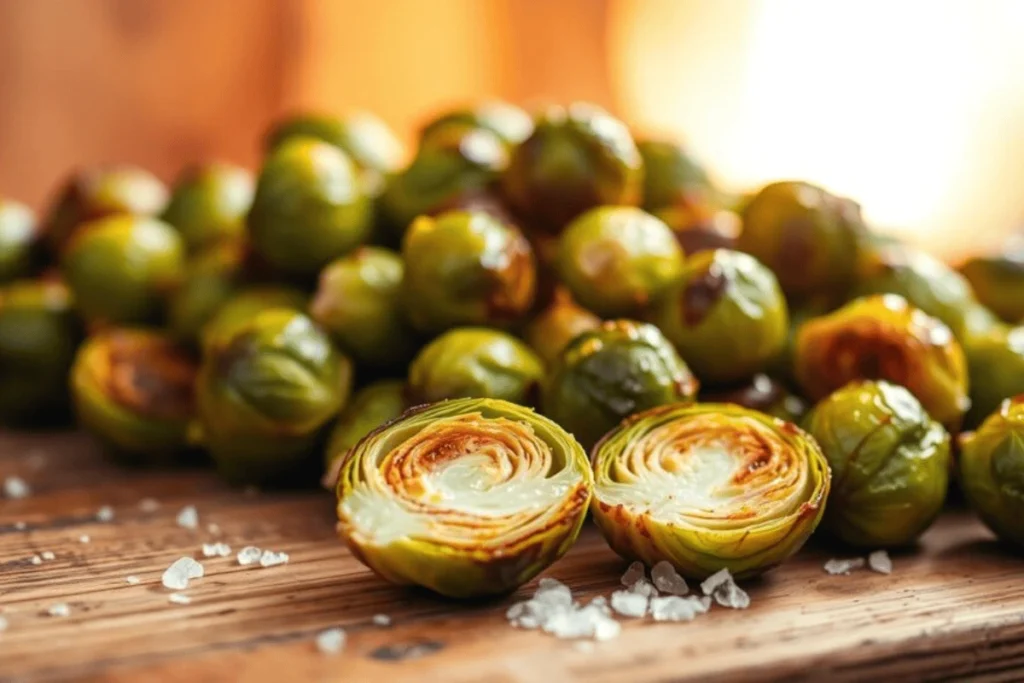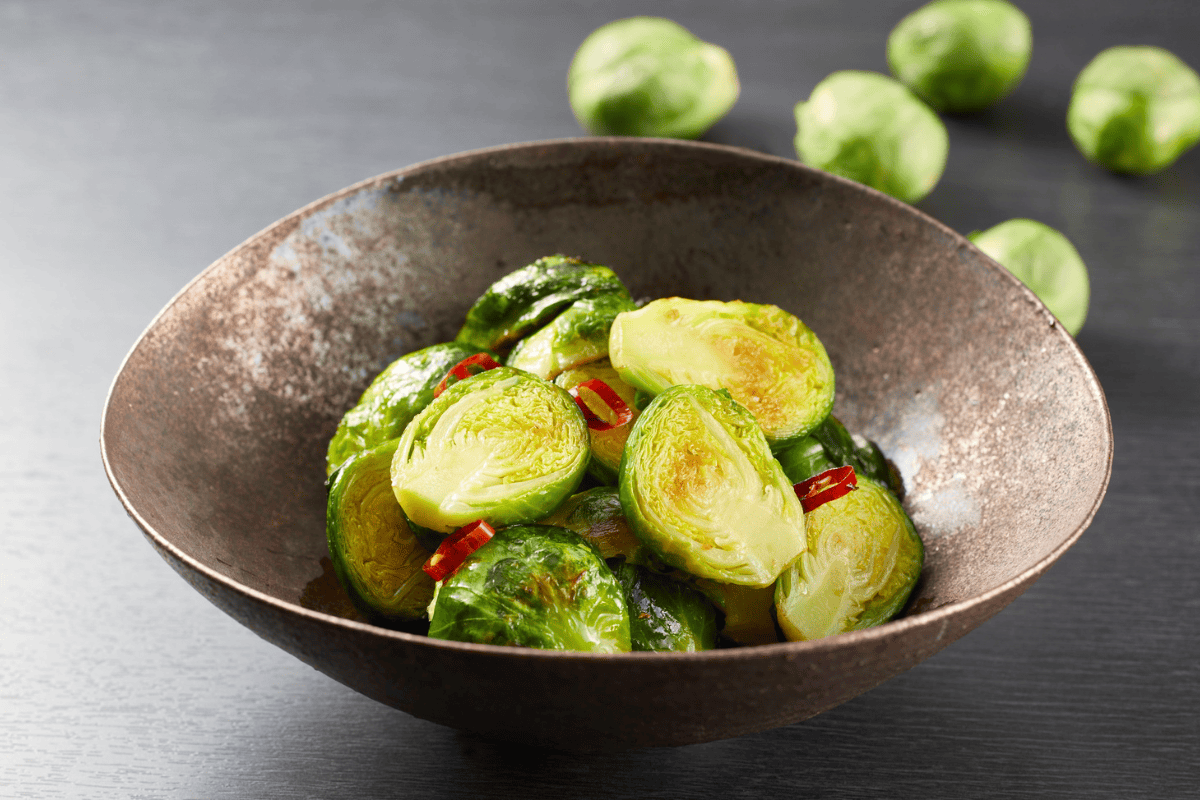Ever thought roasted Brussels sprouts were just another bland veggie? Think again. They’re small but packed with health benefits. The health benefits of roasted Brussels sprouts go beyond taste; they’re not just good for you but also delicious. Roasted to perfection, these little powerhouses offer a combination of flavor and nutrients that make them a must-try.
This humble veggie is more than a diet trend. It’s a nutrient-rich ally for your health journey.
Table of Contents
Key Takeaways
- Roasted Brussels sprouts are a low-calorie vegetable perfect for weight management while keeping you full.
- They deliver vitamins C and K, boosting immunity and bone health naturally.
- Packed with antioxidants to fight inflammation and support disease prevention.
- Roasting enhances their flavor and unlocks nutrients without added fats.
- An easy, versatile addition to meals for a nutrient boost without extra calories.
Roasted Brussels Sprouts: A Nutritional Powerhouse for Your Health
Brussels sprouts are more than just a trendy side dish. They are packed with essential nutrients that support overall health. Each bite is packed with vitamins, fiber, and antioxidants. These work together to support your body’s daily needs.
Essential vitamins and minerals profile
These tiny veggies are vitamin powerhouses. A single cup gives you over 100% of your daily vitamins c and k, plus vitamin b6 and minerals like potassium. Here’s what they do for you:
- Vitamin C strengthens immunity and skin repair
- Vitamin K plays a key role in promoting bone health and aiding blood clotting.
- Potassium aids muscle function and blood pressure regulation
“Vitamin K’s role in bone health is critical for long-term wellness,” says the USDA’s MyPlate guidelines.
Fiber content and its importance
Brussels sprouts are a high-fiber food, offering 4g of fiber per cup. This fiber:
- Feeds gut bacteria for digestive health
- Slows sugar absorption to stabilize energy levels
- Helps lower cholesterol to protect heart health
Antioxidant properties that fight oxidative stress
These sprouts contain antioxidants like kaempferol and quercetin. Here’s how they protect your cells:
| Antioxidant | Key Benefits |
|---|---|
| Kaempferol | Reduces cellular damage and supports heart health |
| Quercetin | Neutralizes free radicals to combat chronic inflammation |
These compounds help fight oxidative stress linked to aging and diseases like heart disease.

Roasted Brussels Sprouts Health Benefits
Roasting does more than just add flavor. It unlocks health benefits that turn your plate into a wellness powerhouse. The process makes their natural nutrients more accessible, helping your body absorb fiber better. This fiber feeds the good bacteria in your gut, improving digestion and boosting your immune system.
Roasted Brussels sprouts are packed with antioxidants that fight oxidative stress. They also contain compounds like sulforaphane, which help reduce inflammation. Chronic inflammation, which can lead to arthritis and heart disease, is lessened by these natural fighters. Studies show eating them regularly can also help keep blood sugar levels stable, supporting metabolic health.
- Supports microbiome diversity for better nutrient absorption
- Reduces systemic inflammation markers
- Encourages steady energy levels through stable blood sugar
A 2022 study in Nutrition Journal found roasted Brussels sprouts consumers had 20% lower inflammatory markers than raw varieties due to heat-activated compounds.
Eating them once a week can improve gut health and protect against chronic diseases. Their crunch is not just pleasing—it’s backed by science, offering real nourishment.
Disease-Fighting Properties of This Cruciferous Vegetable
Brussels sprouts can be much more than just a simple side dish. They are packed with disease-fighting power. Learn how their natural compounds fight serious health threats.
Cancer Prevention Through Glucosinolates
Roasting roasted Brussels sprouts boosts their cancer-fighting properties. Glucosinolates, found in these veggies, turn into isothiocyanates and indoles when cooked. These compounds help fix DNA, stop tumors, and fight cancer-causing agents.
Research shows cooking veggies makes them more effective. So, roasted Brussels sprouts are a great choice.
Heart Health and Cholesterol Management
| Nutrient | Role in Heart Health |
|---|---|
| Fiber | Binds to cholesterol, aiding its removal from the body |
| Potassium | Helps balance blood pressure |
| Vitamin K | Supports blood vessel and artery health |
Inflammation Reduction and Chronic Disease Prevention
Chronic inflammation causes diseases like arthritis and diabetes. Brussels sprouts have kaempferol and vitamin C, which fight inflammation. These antioxidants protect your cells and arteries, reducing disease risk.
- Antioxidants neutralize free radicals that damage tissues
- Vitamin C boosts immune function while calming inflammation

Why Roasting Roasted Brussels Sprouts Enhances Their Health Value
Roasting isn’t just tasty—it’s a healthy cooking method backed by science. It keeps more nutrients in the food. Unlike boiling, which loses water-soluble vitamins, roasting locks them in. The sprouts’ sugars also caramelize, adding a sweet flavor without losing vitamins.
- Heat activates enzymes that break down compounds blocking nutrient absorption.
- Light oil coatings (like olive oil) help your body absorb fat-soluble vitamin K.
- Cooking at 400°F (202°C) for a shorter time helps minimize oxidation compared to slower cooking methods.
Studies show roasting keeps up to 30% more vitamin C than boiling (source link) and provides more nutrients overall. Steaming, often seen as healthy, can lose 15-20% of B vitamins. To avoid harmful compounds, stop roasting when the edges are golden brown. Adding healthy fats like avocado oil boosts nutrient retention even more.
Want to try it? Coat the sprouts with olive oil, and season with salt and pepper. Roast for 20-25 minutes. This simple method turns a humble veggie into a nutrient-rich food without losing flavor. Your body gets more vitamins, and you enjoy a crispy, tasty side dish, all thanks to roasting.
Conclusion: Adding Roasted Brussels Sprouts to Your Wellness Routine
Roasted Brussels sprouts are more than just a trendy side dish. They are packed with nutrients and low in calories. Eating 2–3 cups a week can help you manage your weight and keep you full.
Health Benefits of Roasted Brussels Sprouts include their ability to support digestion, provide essential vitamins, and help protect your body from illness. Choose fresh sprouts with bright green leaves. Store them in a bag with holes to stay crisp. Mix them with olive oil, garlic, and sea salt for a tasty roast. They’re full of fiber, which helps your digestion and keeps your gut healthy.
Brussels sprouts also have vitamin C and antioxidants. These help fight off sickness and protect your body from harm. If you’re new to high-fiber foods, start slow to avoid any discomfort.
Pair them with protein to get all the nutrients you need. Their rich, earthy flavor pairs perfectly with lemon, Parmesan, or paprika, making each bite delightful.
Start adding roasted Brussels sprouts to your weekly meals for a delicious and nutritious boost. Toss them with olive oil, garlic, and sea salt for an easy, healthy side dish that supports your wellness goals. They are calorie-friendly and packed with essential nutrients. Choose quality ingredients and seasonings to make healthy eating a tasty habit. Reap all the health benefits of roasted Brussels sprouts by making them a regular part of your diet.
FAQ
How many calories are in roasted Brussels sprouts?
Roasted Brussels sprouts have about 38 calories per cup. They are perfect for those trying to keep a healthy weight. You’ll feel full and satisfied.
What nutritional benefits do Brussels sprouts provide?
Brussels sprouts are full of vitamins and minerals. They are rich in vitamins C and K. They also have fiber and antioxidants that boost health, including gut health and reduce inflammation.
Why are Brussels sprouts considered a high-fiber food?
One cup of Brussels sprouts has about 4 grams of fiber. This makes them great for healthy digestion and gut health. Fiber also helps you feel full and control blood sugar.
How do Brussels sprouts help reduce inflammation?
Brussels sprouts are full of antioxidants like kaempferol. These antioxidants fight harmful free radicals in the body. This helps reduce inflammation, which is linked to chronic diseases.
Do Brussels sprouts have cancer-fighting properties?
Yes, Brussels sprouts have compounds called glucosinolates. These break down into isothiocyanates, which may protect cells from damage. They could help stop cancer growth.
What is the best cooking method for retaining nutrients in Brussels sprouts?
Roasting Brussels sprouts is best. It keeps more nutrients than boiling. Roasting also makes them taste better through caramelization.
How often should I eat Brussels sprouts for health benefits?
Eat 2-3 cups of roasted Brussels sprouts a week. This can improve your digestion and overall health.
Can Brussels sprouts help with weight management?
Yes, Brussels sprouts are low in calories but high in fiber. They help you feel full without adding many calories. This makes them good for weight management.
What are the top variations of roasted Brussels sprouts?
You can try adding balsamic vinegar, Parmesan, garlic, or even bacon for a delicious twist. Check out more variations here.
Roasted Brussels Sprouts
Equipment
- Baking Sheet
- Mixing Bowl
Ingredients
Brussels Sprouts
- 1 lb Brussels sprouts trimmed and halved
- 2 tbsp olive oil
- 1 tsp sea salt
- 1/2 tsp black pepper
- 1 tbsp lemon juice optional, for added freshness
Instructions
- Preheat the oven to 400°F (200°C).
- In a mixing bowl, toss Brussels sprouts with olive oil, salt, and black pepper until evenly coated.
- Spread the Brussels sprouts on a baking sheet in a single layer.
- Roast for 20-25 minutes, shaking the pan halfway through, until sprouts are golden brown and crispy.
- Remove from the oven and drizzle with lemon juice if desired. Serve immediately.

